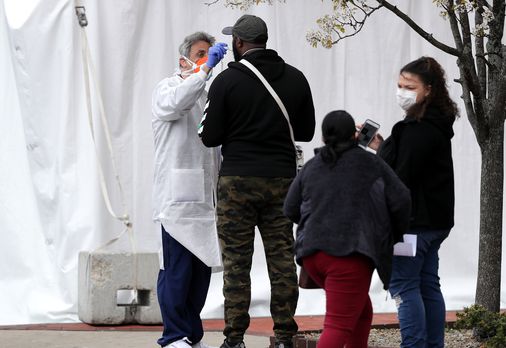We need as a state to really invest in robust outreach to these communities to ensure that they get the vaccine as soon as its available to them, said Eva Millona, president and CEO of the Massachusetts Immigration and Refugee Coalition, who remains concerned that immigrants and other people of color will get left behind in the states mass immunization effort.
The pandemic has taken an enormous toll on Black, Latino, and indigenous people, who are getting sick and dying from COVID-19 at rates far exceeding their white counterparts.The plight is apparent in Massachusetts, where the burden of the pandemic has fallen heavily on low-income Gateway Cities like Chelsea, Lawrence, and Brockton that are populated by immigrants and people of color, many working essential jobs and living in crowded housing.
As many epidemiologists are quick to point out, vaccinations not vaccines will be key to ending the pandemic, and allocations of doses mean nothing if the people who need them arent able or willing to get the injections.
According to a recent survey of Massachusetts residents, just 11 percent of Black and 32 percent of Hispanic respondents are willing to get vaccinated as soon as possible, compared with 59 percent of white respondents and 71 percent of Asians. The same poll, by Suffolk University and The Boston Globe, found nearly one-third of Black residents and about one-quarter of Hispanic residents dont want to take a COVID-19 vaccine at all.
The last four years under the [Trump] administration … have made really a huge impact on immigrant communities to be really distrustful of government institutions, Millona said. Throughout the pandemic, many immigrants have avoided COVID-19 testing and treatment, fearing they could jeopardize their immigration status. And the same fear applies now to the vaccine, she added.
Massachusetts is rolling out its vaccination program in three phases, with the first prioritizing health care personnel and residents and staff of long-term care facilities. In Phase Two, slated to begin in February, vaccines will be reserved for people with chronic illnesses, essential workers, and adults 65 and older. By Phase Three,which could start as early as April,anyone who wants to be vaccinated will be able to do so.
Under the states plan, during Phases Two and Three, Massachusetts will set aside 20 percent of its vaccine supply for cities and towns with high social vulnerability and COVID-19 cases per capita. The extra doses will supplement their initial allotment, which, for all communities, will be based on population size.
The Social Vulnerability Index, asdefined by the Centers for Disease Control and Prevention, is a measure of a communitys ability to respond to a crisis or natural disaster. It is calculated using variables from census data, including poverty and unemployment rates, and racial and ethnic composition.
The list of Massachusetts cities and towns receiving an additional 20 percent allocation has not yet been approved by the Department of Public Health, but it is likely to include places like Chelsea, where the viruss devastation can be observed not only in climbing caseloads, but in eviction notices and food pantry lines.
The [states COVID-19 advisory] group discussed various percentages, and I would say 20 percent was appropriate given how quickly we want to be able to interrupt transmission in those communities that are hardest hit, said Dr. Paul Biddinger, director of emergency preparedness at Mass General Brigham and chairman of the states COVID-19 advisory group.
Equity was considered in every tier of the states distribution plan, he noted, starting in the first phase by ensuring all health care workers, including those who work in sanitation, food service, and other supportive roles were prioritized, in addition to those who are incarcerated or living in homeless shelters.
The Massachusetts Immunization Information System, or MIIS, a confidential online registry of vaccination records, will allow the state to monitor vaccine uptake in cities and towns in real time, Biddinger said, and showcase if there are areas that need more attention.
But many remain skeptical of government initiatives to equitably distribute the vaccines to marginalized communities. Black Americans distrust in the coronavirus vaccines stems from a sordid history of medical abuse and misconduct that continues to this day and isnt going to be easily overcome, said Shawnita Sealy-Jefferson, a social epidemiologist and professor at Ohio State University.
However, public officials can make inroads by doing some radical truth-telling, she said, about the role of structural racism in producing the yawning racial and ethnic disparities in COVID-19 infections and deaths, and committing to do better.
[The pandemic] is disproportionately impacting communities of color and thats not by accident. Thats a condition of the way our society is organized, Sealy-Jefferson said. We cant have equitable distribution of a vaccine when this country isnt equitable by definition.
Michael Curry, incoming president and CEO of the Massachusetts League of Community Health Centers, and a member of the states COVID-19 advisory committee, said trusted community voices will be essential to the successful rollout of the vaccines in hard-hit places. The onus, he said, is on health care providers, elected officials, religious leaders, and employers to shed light on the past and provide some reassurances about the safety and efficacy of the vaccines.
We all have a role to play in this, he said, and shame on us if we do not acknowledge that hesitancy.
Deanna Pan can be reached at deanna.pan@globe.com. Follow her on Twitter @DDpan.read more
Vaccine rollout earmarks additional doses for hard-hit Mass. communities. But delivering on that could be a challenge


